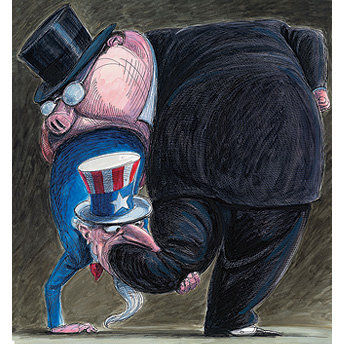Inter-Capitalist Rivalries and Political Rebellion against the US Multinational Corporate Elite
Rebellion in the Suites: Tax Collectors and Businesspeople

Large-scale political and economic challenges are confronting the US multi-national corporate elite. Apple, Google, Facebook, Microsoft, Pfizer and scores of other multinational tax evaders are facing the triple threat of multi-billion dollar fines, the redistribution of their wealth and the possible reintroduction of equitable socio-economic programs, which could undermine their power.
Washington-backed exporters and financiers, eager to impose free trade agreements on European and Asian business classes, have been faced with stiff resistance and outright rejection.
In Latin America, the Obama administration recently installed neo-liberal regimes in Argentina and Brazil, provoking massive opposition from small and medium sized firms driven into bankruptcy by their harsh policies.
Intense intra-capitalist rivalries are no longer confined to the conference table: Open warfare, involving large-scale transfers of capital, has undermined the foundation of international capitalist class solidarity. While working class movements and mass protests still occur, the fundamental internal capitalist antagonism toward the US Empire has become the driving force of the current upheavals.
We will identify the alignment of forces and the implications of these challenges to the power and wealth of the multi-national corporations. We will then highlight the break-up of the free trade treaties and the demise of US dominance in Europe and Asia. In the final section, we will focus on the rise and decline of the latest US interventions to subordinate Latin America to its domination, starting with the legislative coup in Brazil and the conflicts in Argentina.
The European Commission and Apple ‘s Tax Evasion
 The European Commission (EC) imposed an initial $13 billion penalty on the Apple Corporation for tax evasion – with tens of billions of more fines to come. The EC announced that Apple’s ridiculous 0.005% corporate tax rate in Ireland was a form of theft, exposing its phony posture as a defender of human rights and a paragon of corporate social responsibility. Scores of the biggest US multi-nationals have set-up overseas operations, especially in Ireland, specifically to avoid paying taxes. These include Google, Facebook, Microsoft, Pfizer and scores of others among the ‘Fortune five hundred’.
The European Commission (EC) imposed an initial $13 billion penalty on the Apple Corporation for tax evasion – with tens of billions of more fines to come. The EC announced that Apple’s ridiculous 0.005% corporate tax rate in Ireland was a form of theft, exposing its phony posture as a defender of human rights and a paragon of corporate social responsibility. Scores of the biggest US multi-nationals have set-up overseas operations, especially in Ireland, specifically to avoid paying taxes. These include Google, Facebook, Microsoft, Pfizer and scores of others among the ‘Fortune five hundred’.
Apple’s multi-billion-dollar tax scams were possible because of support from the US Treasury, Commerce and Trade Departments. Indeed, Treasury Secretary, Jack Lew, launched a tirade against the European Commission, threatening retaliation, claiming that these US tax swindles were vital to the security of world trade. Wall Street flunky, Senator Charles Schumer called the EU penalty ‘a cheap money grab’ and threatened to start a trade war with Europe if the Democrats regain power in the upcoming Senatorial and Congressional elections.
The entire US imperial edifice operates through corrupt multi-national corporate tax swindlers who control and direct their politician stooges who, in turn, intimidate, submissive European regimes (like Ireland). The system is now being challenged by rival European economic powers intent on reducing the US tax advantages to increase their competitiveness. The growing competition over profits, markets and tax receipts has important political implications as the US dominance of Europe depends on the supremacy of its multi-nationals.
US taxpayers subsidize the US multi-nationals even when they relocate jobs abroad to cheap labor markets and move their corporate head offices to low-tax countries. The result is that the US government has to increase the tax burden on wage- salaried workers and small businesspeople to finance social programs and critical infrastructure because the US multinationals have moved their ‘addresses’ to tax havens.
As Europe tightens the squeeze on the US billionaire tax fraudsters, Washington will retaliate by mobilizing its own stable of European flunkies and the ever-compliant US Senators. Capitalist warfare may increase ‘nationalist’ rancor and undermine Atlantic trade treaties.
The End of Atlantic and Pacific Trade Agreements
In demanding an end to negotiations with the US over the trans-Atlantic trade deal, the French minister for foreign trade summed up his country’s position: “There is no political support from France for those negotiations. . . the Americans give nothing or just crumbs”. Throughout Europe politicians of the Left and Right have pointed out that closer ties with the US undermine their business deals with Russia and China, dilute environmental protection and abolish workers’ rights.
Parallel developments are taking place in Asia with regard to the trans-Pacific trade deal: The US has failed to convince Asian countries to sign bilateral and multilateral trade pacts designed to exclude China.
Asia’s increasing use of China’s currency (the renminbi) shows that the Anglo-American bloc has declined as the center of foreign exchange markets and trade. The US no longer dominates Asia: Even its former colony, the Philippines, has made overtures to China. Cambodia has granted China extended use of a deep-water port, strengthening Beijing’s position as the dominant maritime power in Asia. The US ally, Australia increasingly depends on trade with Beijing. China’s mix of public-private capitalism has out-muscled the US in Asian markets while deepening its trade links with Russia, Iran, the Gulf States, Africa and Latin America.
To the extent that international capitalism has ‘recovered’ from the economic crisis of the recent past, it is thanks to Chinese–Asia capitalism. The policy failures of the US Treasury, Commerce and Trade departments have led to calls for protectionism – domestically with the Trump campaign – and growing militarism among both candidates.
Increasingly the struggle for world markets among regional capitalist blocs- Anglo-American, European and Sino-Asian –defines the nature of global instability.
Latin America: The Rebellion of the Middle Class
On the surface, Washington and Wall Street have gained some important political victories: In Argentina, the Mauricio Macri regime has imposed an economic agenda totally in line with Washington’s free trade demands. In Brazil, Washington successfully promoted the legislative coup impeaching the center-left government of President Dilma Rousseff and installing the corrupt Vice President Temer .The proxy regime is dedicated to de-nationalizing and privatizing strategic, lucrative sectors of the economy.
In Venezuela, Washington’s proxies who have gained control of the congress are organizing to oust the left-of-center Maduro government through street protests, sabotage and the hoarding of vital commodities.
Nevertheless the image of middle class and local capitalist support for Washington’s agenda is proving ephemeral. Once installed at the top, the US-backed local proxies are rapidly imposing brutal austerity policies that undermine middle class and, of course, working class support.
After merely nine months in power, Argentine President Macri and his Washington backers face open opposition from the entire range of small and medium size businesses.
Inflation and deflation, utility price increases of 400% to 1000% have bankrupted at least a fourth of small-scale commercial and medium-size business firms in Argentina. Thousands have massed in the streets. On September 2, a broad based multi-class demonstration of several hundred thousand took over the famous Plaza de Mayo in the center of Buenos Aires to denounce Macri’s devastating neo-liberal agenda.
Similar mass actions are erupting in Brazil, as the US-backed Temer regime slashes government budget subsidies, credit and public investments. His public approval rating (never high because of his own corruption) has dropped to a single digit.
In a short time the business class has become deeply divided between the top tier, linked to international capital, and the middle and lower tiers. The initial consensus opposing the left-populist government has rapidly disintegrated while the unity of the capitalist class has collapsed.
Conclusion
In the current phase of global capitalism, the most striking socio-economic dynamics are located in the deepening intra-capitalist conflicts between regions, nations and among segments of the capitalist class. The ideologues of capitalist globalization and regional integration are finally exposed as false prophets. Attempts by the US to impose a new world order that subordinates Europe and Asia have failed; the US now faces internal dissension, notably in US Presidential candidate Donald Trump’s ‘American First’ campaign, pressing for ‘national solutions’.
The European capitalist elite is now only willing to collaborate with Washington where US-Europe trade agreements can be mutually beneficial – they openly reject being reduced to ‘reaping crumbs.’ National capitalism has emerged as the new reality on both sides of the Atlantic and across the globe in Asia, as China emerges as the dominant economic force in the region. China’s quest to secure global markets and investment sites has set in motion rival nationalist alignments, which threaten US regional power.
Rebellions by capitalist political elites are the ‘new norm’ everywhere. Multi-national rivalries over tax evasion and its consequences are leading to ‘tit-for-tat’ reprisals, which can rupture historical ties.
Latin American capitalist triumphs over the left are short-lived, as the different segments engage in violent divisions and realignments.
The ultra-militarist US is incapable of establishing a stable world capitalist order under its direction. Instead, we now find a multiplicity of capitals and competing state regimes with subordinate and divided segments of the capitalist class. Trans-Atlantic and Pacific unity fractures, and each sub-region seeks its own socio-economic partners. Trade talks cease and acrimony reigns.
Given the US total reliance on military-driven empire building, this post-imperial emergence of national and class rivalries is more likely to lead to war than to a new just social order.

